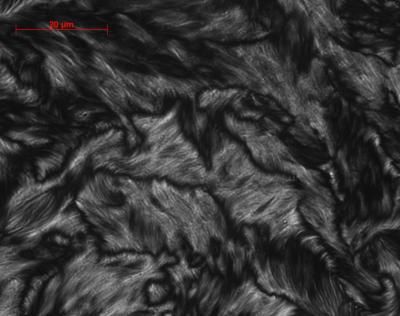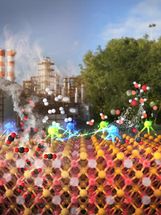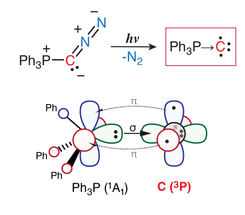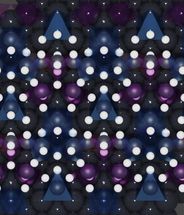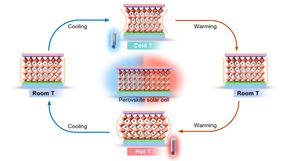Cotton with special coating collects water from fogs in desert
Researchers at Eindhoven University of Technology (TU/e) together with researchers at the Hong Kong Polytechnic University (PolyU), have developed a special treatment for cotton fabric that allows the cotton to absorb exceptional amounts of water from misty air: 340% of its own weight. What makes this 'coated cotton' so interesting is that the cotton releases the collected water by itself, as it gets warmer. This property makes of the coated cotton materials a potential solution to provide water to the desert regions, for example for agricultural purposes.
The researchers applied a coating of PNIPAAm, a polymer, to the cotton fabric. At lower temperatures, this cotton has a sponge-like structure at microscopic level. Up to a temperature of 34°C it is highly hydrophilic, in other words it absorbs water strongly. Through this property the cotton can absorb 340% of its own weight of water from misty air – compared with only 18% without the PNIPAAm coating.
Totally pure water
In contrast, once the temperature raises the material becomes hydrophobic or water-repellant, and above 34°C the structure of the PNIPAAm-coated cotton is completely closed. When these high temperatures are reached the cotton has released all the absorbed water, which is totally pure. The research shows that this cycle can be repeated many times.
Inspiration from Nature
Beetles in desert areas can collect and drink water from fogs, by capturing water droplets on their bodies, which roll into their mouths. Similarly, some spiders capture humidity on their silk network. This was the inspiration for this new coated-cotton material, which collects and releases water from misty environments simply as the temperature changes throughout the day.
Low-cost material
This property implies that the material may potentially be suitable for providing water in deserts or mountain regions, where the air is often misty at night. According to TU/e researcher dr. Catarina Esteves a further advantage is that the basic material – cotton fabric – is cheap and can be easily and locally produced. The polymer coating increases the cost slightly, but with the current conditions the amount required is only about 12%. In addition, the polymer used is not particularly costly.
Placed directly on the soil
Fine-mesh ‘fog harvesting nets’ are already being used in some mountains and dry coastal areas, but these use a different principle: they collect water from misty air, by droplets that gradually form on the nets and fall to the ground or a suitable recipient. But this system depends on a strong air flow, wind. The coated cotton developed the research team can also work without wind. In addition, cotton fibers coated with this polymer can be laid directly where the water is needed, for example on cultivated soil. The researchers are also considering completely different applications such as camping tents that collect water at night, or sportswear that keeps perspiring athletes dry.
Most read news
Other news from the department science
These products might interest you

Eclipse by Wyatt Technology
FFF-MALS system for separation and characterization of macromolecules and nanoparticles
The latest and most innovative FFF system designed for highest usability, robustness and data quality

Spinsolve Benchtop NMR by Magritek
Spinsolve Benchtop NMR
Spinsolve is a revolutionary multinuclear NMR spectrometer that provides the best performance
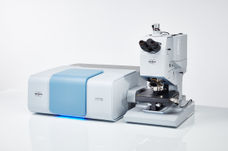
HYPERION II by Bruker
FT-IR and IR laser imaging (QCL) microscope for research and development
Analyze macroscopic samples with microscopic resolution (5 µm) in seconds

Get the chemical industry in your inbox
By submitting this form you agree that LUMITOS AG will send you the newsletter(s) selected above by email. Your data will not be passed on to third parties. Your data will be stored and processed in accordance with our data protection regulations. LUMITOS may contact you by email for the purpose of advertising or market and opinion surveys. You can revoke your consent at any time without giving reasons to LUMITOS AG, Ernst-Augustin-Str. 2, 12489 Berlin, Germany or by e-mail at revoke@lumitos.com with effect for the future. In addition, each email contains a link to unsubscribe from the corresponding newsletter.
